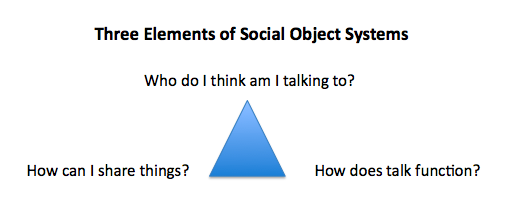This Edge blog post suggests that Facebook’s problem isn’t that it violated people’s expectation about privacy, but that it’s trying to change the social dynamic on the site from conversation between friends and family to sharing information. I think this distinction is misleading regarding people’s communication, Facebook’s strategy, and Twitter’s strategy too.
The article argues that Facebook was initially set up as a way to talk with friends and family. But the new default-public settings make it more of a tool for sharing information. A lot of what people do on Facebook is to share stuff – photos, links, videos, etc. Thing is, that sharing is social activity – people sharing stuff with family and friends. This sharing on Facebook is increasing rapidly – the stats in the Inside Facebook article don’t say why, but I very strongly suspect it’s because Facebook has made sharing very easy, not because people are suddenly thinking themselves as publishers.
By contrast, Twitter’s leadership has seen Twitter as more of a broadcast platform. Features like follower counts and the retweet feature supported that strategy, and did less to support conversational use. (The retweet feature removed the ability to add a comment, and emphasized the number of times the tweet had been shared). But recent speculation is that they might come out with conversation threading, which would make conversation easier.
I think that the perceived polarity between “sharing information” and “conversation” does everyone making and using social tools a disservice. When there’s two-way communication, people share information and talk to each other. That was the initial insight about social objects from Jyri Engestrom. One of the cultural fundamentals in the modern world is that people socialize around common interests, symbolized by things we share with each other. Sharing bits of content doesn’t mean we’re being less social, it means we can share a clip when we talk about a sports game or a link when we talk about a news story – familiar types of social conversation.
The experience around social objects has several elements – who you think you’re talking to (as danah boyd and Kevin Marks described), the affordances for sharing the object (where Engestrom focused), and the ways the dynamics of listening and interchange work and are visible to participants. (where Adrian Chan focused).
The problem with Facebook’s changes and clumsy user experience to set levels of sharing are about Facebook trying to influence people’s decisions who they share with, and proliferating confusion about who people share with. They messed up the “who I’m talking with” attribute. Twitter’s focus on the competitive aspects of talk hampers the social dynamic of sharing. Information and conversation go together. There are design and business opportunities in getting the blending right.

Is information the opposite of conversation? http://www.alevin.com/?p=2348
This comment was originally posted on Twitter
BookBlog » Blog Archive » Information vs. conversation? – Adina …http://bit.ly/bWj5UL
This comment was originally posted on Twitter
Is information the opposite of conversation? http://www.alevin.com/?p=2348
This comment was originally posted on Twitter
RT @alevin Is information the opposite of conversation? http://www.alevin.com/?p=2348
This comment was originally posted on Twitter
The question isn’t conversation or sharing regarding the FB/Twitter difference. The question is WHO is the audience. Conversation, sharing and broadcast are happening on all mediums, the choice of content and form is dependent on audience. The FB and Twitter audiences are VERY different for most users. Tweet content to Ashton Kutcher, Newsweek and several “organizations”, and like-minded people is and should be different from FB posts to family, friends and an odd mix of real relationships.
Information vs. Conversation? http://bit.ly/axEaxT #SxD
This comment was originally posted on Twitter
RT @semanticwill: Information vs. Conversation? http://bit.ly/axEaxT
This comment was originally posted on Twitter